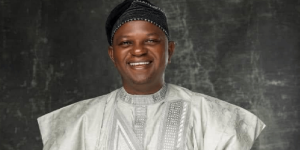Nigerian government, in collaboration with UNICEF and other development partners, has unveiled what looks an ambitious plan to accelerate the provision of climate-resilient, safe, and sustainable drinking water, sanitation, and hygiene services within the country.

At the Nigeria/UNICEF Annual WASH Review Meeting in Abuja on Thursday, January 25, 2024, Prof. Joseph Utsev, Minister of Water Resources and Sanitation, said the target aligned with the objectives of SDG 6.1 and 6.2, and the National Open Defecation Free (ODF) 2025 Roadmap.
According to him, the meeting is a pivotal moment for stakeholders in the Water, Sanitation, and Hygiene (WASH) sector to assess progress and discuss strategies for the future.
Expressing concern over the lag in access to sanitation and hygiene services compared to water supply, the Minister highlighted the crosscutting impact of WASH issues on various sectors like health, education, and the economy.
Emphasising the critical role of achieving WASH targets under SDG 6 in Nigeria, he underscored the potential regional and global implications, given the country’s strategic position.
Utsev said government’s unwavering commitment to addressing sector gaps and prioritising WASH was evident through initiatives led by his ministry.
These initiatives, he said, included the National Action Plan for WASH Sector Revitalisation, the “Clean Nigeria: Use the Toilet” Campaign, and the Sustainable Urban and Rural WASH (SURWASH) Project, among others.
He added that federal government reinforced its commitment with initiatives like the development of a National WASH Policy and the signing of MoU for SchoolWASH, HealthWASH, and YouthWASH Programmes.
“These initiatives showcase the government’s strong political will to reverse Nigeria’s poor WASH indices and expedite access to sustainable services in institutions and public places.”
Utsev highlighted the Annual WASH Sector Review as an opportunity for collective reflection and agreement on a new trajectory to accelerate the achievement of SDG 6.1 and 6.2 in Nigeria.
Dr Rownak Khan, UNICEF Deputy Representative in Nigeria, emphasised the commitment to addressing the challenges faced by children in the country, calling for deliberate funding of $9 billion annually for the WASH sector.
Khan highlighted UNICEF’s multifaceted programmes aimed at ensuring fundamental social services for children, with a particular focus on access to clean water and sanitation.
Expressing concern over contaminated water affecting a significant percentage of children, Khan revealed that 68 per cent of available water sources were contaminated with harmful organisms.
She said working collaboratively with the government and various partners, UNICEF would facilitate gradual and progressive access to clean water for children.
“In addition to addressing water contamination, the organisation is actively involved in training local counterparts to maintain functional water points and improve access to clean sanitary facilities.
“These efforts are part of the Clean Nigeria campaign, which aims to eliminate open defecation practices.
“Moreover, UNICEF’s engagement extends beyond the school environment, reaching communities where access to clean water and sanitation is essential for all children, whether in school or not.”
Discussing the impact of climate change on children, Khan referred to a November-launched report analysing the vulnerability of Nigerian children to diverse climate-related challenges, such as droughts and floods.
The deputy representative said UNICEF planned to collaborate with the Ministry of Environment and the Ministry of Water Resources and Sanitation to formulate an action plan in response to these climate challenges.
Earlier, Alhaji Aliyu Shinkafi, the ministry’s Permanent Secretary, highlighted the importance of partnership and acknowledged achievements and hurdles in providing sustainable WASH solutions.
Shinkafi, represented by Mrs Elizabeth Ugoh, Director, Water Quality Control and Sanitation, commended stakeholders for their dedication, emphasising the commitment to the well-being of every Nigerian.
He expressed confidence in the transformative collaboration and anticipated even greater strides in the future, expressing gratitude to UNICEF and partners for their support.
The annual forum served as an opportunity for key stakeholders to evaluate the achievements of the FGN/UNICEF WASH activities during the inaugural year of the 2023 to 2027 implementation cycle.
By Tosin Kolade
